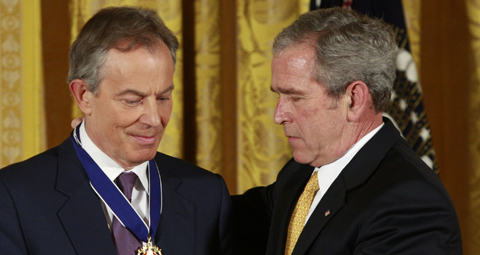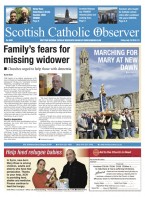July 15 | ![]() 0 COMMENTS
0 COMMENTS ![]() print
print

Blair and Bush ignored Vatican warnings
Following the Chilcot report into the Iraq War Hugh McLaughlin looks at the Pope’s prescient warning
By Hugh McLoughlin
Robert Fisk, a journalist who has won awards for his coverage of the Middle East, described events in Baghdad on the evening of Friday, March 21, 2003, thus: “From high-rise buildings, shops and homes came the thunder of crashing glass as the shock waves swept across the Tigris River in both directions.
“Minute after minute the missiles came in. Many Iraqis had watched—as I had—television film of those ominous B-52 bombers taking off from Britain only six hours earlier. Like me, they had noted the time, added three hours for Iraqi time in front of London and guessed that, at around 9pm, the terror would begin. The B-52s, almost certainly firing from outside Iraqi airspace, were dead on time.”
Sir John Chilcot most definitely did not produce his report on the scrambling of those B-52s—on what led up to it and all that flowed from it—dead on time, but when he finally did, I listened in frank disbelief as he told the assembled media: “Mr Blair told the inquiry that the difficulties encountered in Iraq after the invasion could not have been known in advance.”
I confess that anger was added to that disbelief when, later, Tony Blair reaffirmed: “The aftermath turned out to be more hostile, protracted and bloody than we ever imagined… And a nation whose people we wanted to set free and secure from the evil of Saddam became instead a victim of sectarian terrorism.”
Why disbelief and anger? Because I knew that Tony Blair and George W Bush had been warned, well warned, in advance, well in advance, of exactly what they were liable to unleash by invading Iraq and deposing the evil Saddam Hussein. And make no mistake, Saddam was evil. Indefatigably evil. And his likely successor, his eldest son Uday, was worse. I shed no tears for them. But I do for the hundreds of thousands of Iraqis, of whatever religious or ethnic background, killed and maimed and exiled during and after the appallingly termed ‘shock and awe’ invasion that began on that evening as described so eloquently by Robert Fisk.
I knew Blair and Bush had been warned because the man who warned them was someone whose day to day activities I then took an active interest in, the head of the oldest and best informed diplomatic service in the world: Pope John Paul II! In the case of President George W Bush, the warning was delivered by a papal emissary, His Eminence Pio Cardinal Laghi. However, Blair got the message face to face, on Saturday, February 22, 2003.
‘Nothing is lost by peace, everything may be lost by war”(Pope Pius XII). Just over two weeks before that hellish Friday, Pope John Paul II sent Cardinal Laghi to Washington, to act as his personal emissary to President George W Bush. His Eminence was no stranger to the United States. A junior diplomat in the Washington Apostolic Delegation under Archbishop Amleto, later Cardinal, Cicognani (1954-60), in December 1980 he himself became the delegate, his status being raised to Nuncio in 1984 when full diplomatic relations were established.
As is customary, when his mission to the United States came to an end in April 1990 so, too, did his active diplomatic role and he was appointed to the Roman Curia as pro-Prefect of the Congregation for Catholic Education. In June of the year following, 1991, he received the customary red hat.
More importantly, Cardinal Laghi was no stranger to the Bush family, being regarded by both generations as a close family friend. During his time as the Papal representative in Washington, President Bush Sr (George Herbert Walker) was Vice-President and the future Cardinal was the Second Family’s next door neighbour. Bush Senior and he were tennis partners. This led Pope John Paul and his Cardinal Secretary of State, Angelo Sodano, to believe that he might be properly listened to. It was not to be.
On March 5, 2003, President Bush Jr received Cardinal Laghi. Others present included his National Security Advisor, Condoleeza Rice—who was so attentive that she would later say that she ‘couldn’t understand the Vatican’s opposition to the war’—with the two senior members of the National Security Council with whom she had grilled His Eminence the day before about the Holy See’s position. This makes Rice’s incomprehension all the more incomprehensible. General Peter Pace, Vice-Chairman of the Joint Chiefs of Staff, Jim Nicholson, the US Ambassador to the Holy See, and Archbishop Gabriel Montalvo, the papal Nuncio, were also present. When Cardinal Laghi presented the president with a personal letter from Pope John Paul, he took it and immediately placed it on a side table unopened, unread.
It has been reported by Vatican Insider that Cardinal Laghi told Bush that if the United States went to war three things would happen: there would be many deaths and injuries on both sides; a civil war would follow; and, having got into a war, the USA and its allies would have great difficulty getting out of it. His Eminence echoed Pius XII—speaking the words crafted by his sostituto Mgr Battista Montini, later Pope Paul VI—telling the President: “Nothing is lost by peace, but with war great turmoil will be created.” Especially, he pointed out, in the Arab world.
CNN reported at the time that a senior administration official had informed them that President Bush had assured Cardinal Laghi that war with Iraq would be ‘a last option’ and predicted that ‘a disarmed Iraq would leave the world safer.’ As one American Catholic commentator sympathetic to the Church put it when writing of Cardinal Laghi’s death in 2009: “Rome’s warnings came to reflect the operation’s outcome with far greater accuracy than Washington’s promises.”
Well, he would, wouldn’t he, I hear you say. In April of 2014, interviewed about his recently published book The Global Vatican—which ‘provides an interesting history of relations between the US and the Vatican since the founding of the United States’—Francis Rooney, US ambassador to the Vatican from 2005 to 2008, who succeeded Jim Nicholson, admitted that the Bush administration knew that the Vatican was strongly opposed to the war because it feared three consequences. Those were: increased persecution of Christians, exacerbation of the Shiite/Sunni divide in Iraq, and Iran acquiring a stronger position in the Middle East. Ambassador Rooney acknowledged that all three had come to pass.
But what of Tony Blair? Two weeks before Cardinal Laghi was dispatched to Washington, he travelled to Rome with his wife, Cherie, and three of their four children: Euan, 19, Kathryn, 15, and Leo, 3. On the morning of Saturday, February 22, 2003, he became but the latest, though undoubtedly the most important, head of, or high ranking representative of, government received in private audience by Pope John Paul II.
For each, the message spelled out forcibly and in detail was the same: the weapons inspectors must be given time to complete their task; only the UN could legitimately authorise military action if the Security Council deemed it necessary; precipitate military action to remove Saddam Hussein was likely to lead to disastrous civil unrest with Sunni pitched against Shiite and both against the Christian minority; Iran restored to a position of malign influence; and suffering and death on the grand scale. And not just in Iraq.
Later, Joaquin Navarro-Valls, the papal press officer, gave an official statement which said, in part: “In the course of the cordial conversation which lasted half an hour, they spoke about the complex international situation with particular regard to the Middle East. The Holy Father expressed the hope that, in solving the grave situation in Iraq, every effort would be made to avoid new divisions in the world.”
Brian Barron, the distinguished BBC foreign correspondent, reporting from Rome said: “Mr Blair is keen to be seen showing that he’s going the extra mile, talking to the Pope who is, no question about it, the world’s most revered public figure with an anti-war stance.”
But Blair was not dissuaded from the path he had already chosen. A month later, just hours after those first American cruise missiles were witnessed by Robert Fisk slamming into Baghdad, papal confidante Cardinal Roberto Tucci—like Tony Blair and Cardinal Heard, a convert from Anglicanism—organiser of papal foreign visits of both Popes Paul VI and John Paul II, spoke on Vatican Radio. The onslaught was a ‘defeat for reason and for the Gospel.’ It was the start of a war that was, as Pope John Paul II had told Tony Blair and Cardinal Laghi had told President Bush, ‘beyond all legality and all international legitimacy.’
But the nature of the ‘war’ and its consequences were not beyond the wit of man to predict. Admittedly, neither Blair nor Bush had at their disposal a man as astute and as informed as the then Apostolic Nuncio to Jordan and Iraq, Archbishop Fernando, now Cardinal, Filoni.
However Pope John Paul II made the Filoni assessment available not simply directly to Blair and Bush but also to anyone, including Silvio Berlusconi, who might influence them. Their failure to heed Filoni was arguably a damn sight worse than being merely felonious.











